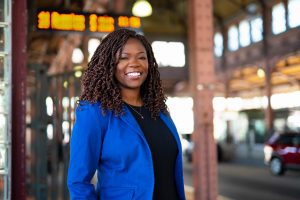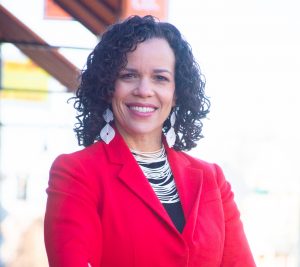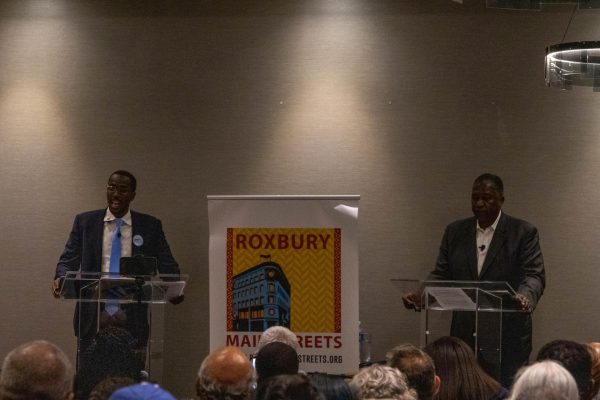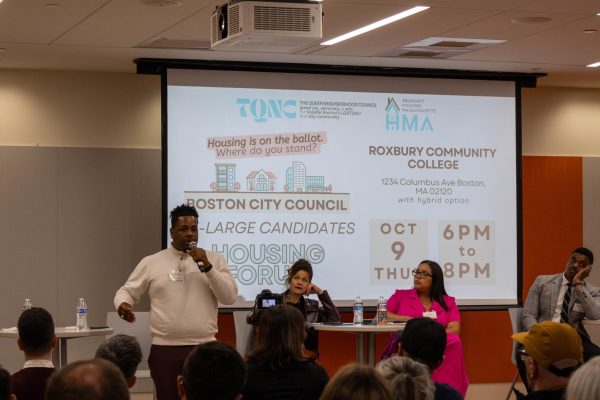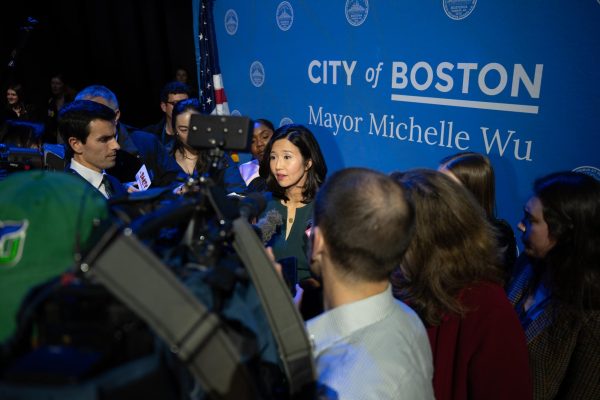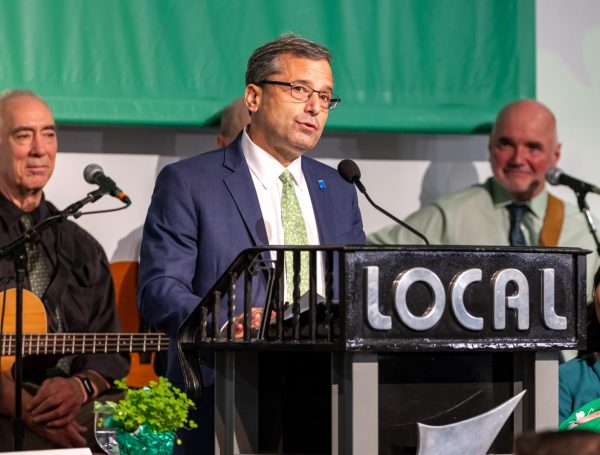City council race: Nikkia Jean-Charles running for District 4
At 18 years old, Nikkia Jean-Charles has worked to advocate for the passing of the Student Opportunity Act in the state house, established a community fridge in her neighborhood in Mattapan, served as a board member of the Greater Mattapan Neighborhood Council and now she is running to become the next city councilor representing District 4, consisting of Dorchester and Mattapan, as well as parts of Roslindale and Jamaica Plain.
“I wanted to create a campaign that is framed by my lived experiences,” Jean-Charles said as she recounts witnessing and being involved herself in violent situations in her community.
Jean-Charles said she wants to run a campaign that enables community members to participate in policy creation as much as possible. “That’s why we created the Accountability Pledge, to hold at least weekly meetings with folks who are in our communities to see how we’re doing,” she said. “So first things first, meeting with communities [listening to] what they’re saying and what they’re addressing their needs. Then, doing research and creating that policy. Going back to the committee members to see how they feel about it, then you can put that into office and propose an ordinance.”
Community members can also provide their opinion and feedback through the campaign’s website or by sending emails to [email protected].
Her campaign priority issues, Jean-Charles said, include diverting police budget to the community, public safety, food insecurity and holding city officials accountable.
Jean-Charles is running against at least 10 candidates including Jacob Urena, Joel Richards, Deeqo Jibril, Trevour Smith, Brian Worrell, William Dickerson, Leonard Lee, Troy Smith, Trina Ruffin and Josette Williams for the District 4 seat. The incumbent, Andrea Campbell, is running for Boston mayor.
The Scope spoke with Jean-Charles to discuss her campaign’s top issues and her plans to address them if elected. The following conversation has been edited for length and clarity.
Can you tell us a bit about yourself and what inspired you to run for office?
My name is Nikkia Jean-Charles. I’m a community organizer, survivor and longtime resident of District 4. I’ve lived in Mattapan my whole entire life so I have seen the good and the bad, but I’m particularly running my campaign on accessibility, reimagination and also accountability and community. I wanted to frame my campaign around my lived experiences, especially growing up in Mattapan and seeing the beauties and also some things that aren’t beautiful in our communities.
Even at a young age I had a deep understanding of what racial disparities in Black and brown neighborhoods like mine [look like], and I really want to make sure that, in this race and also when in office, we’re gonna fight hard to end supremacy in our communities.
I want to make sure that District 4 has better education. For example, Mattapan doesn’t have a public high school. And that’s how you purposely take access to education away from Black and brown people. Growing up as a community organizer, I started doing work at a young age to prevent the Lower Mills Library, which is a library that I went to in elementary school, from shutting down. Once I had transferred schools and went to an elementary school in Mattapan, I went to Mattapan Library but I saw kids who were just like me get the police called on them unnecessarily, just for mental health breakdowns.
And so that was unfortunate and once I got into high school, as Mattapan doesn’t have a public high school, I had to take multiple routes and [use] different forms of transportation just to get to school. I went to school at Cathedral High School, which is right in the South End and I started organizing with St. Stephen’s youth programs. Almost every day after school, we are organizing our office or we’ll be organizing either at the State House or City Hall, so we’ll be bothering all those representatives, because they were working on, my freshman year, the Student Opportunity Act, and that was an Act to basically update the public school funding bill.
So freshman year, we worked hard to make sure that legislation by Sonia Chang-Díaz was able to get passed, and ever since then, that really gave me my extra boost that I needed. My freshman year of high school, the Parkland shooting had happened and so I had also done some work afterwards in March for Our Lives. During that year, there was a coalition that was created between some similar groups in Massachusetts. We went to Smith and Wesson which is right in Springfield, Massachusetts — they’re like, one of the top leading gun manufacturers — we spoke to the CEO and the CEO decided to not try to listen to us. He ended up having to step down. So we look at that and we say that change can happen and will happen. By junior year, the Student Opportunity Act was passed into legislation so I’m really glad to be here, really glad to organize, especially in the city of Boston to make change and make that structural change for our communities and I’m happy to be here with you too.
I’m 18 years old, I started organizing at a young age, but, of course, that never stopped. There was nothing stopping me from organizing. It was either school or organizing, literally. And so, ever since then I’ve been organizing, currently still organizing with students youth programs. In December, I was able to create the Mattapan Community Fridge. I run into folks who are happy that they’re able to get access to these foods, especially free food.
I’m also one of the board members on my neighborhood council which is the Greater Mattapan Neighborhood Council last year when I was 17. It’s community members that had to go vote for you at one of the schools. Even though it’s virtual now, I’m glad to say that I was still able to do that and just fight hard for my community. I love them so much and they deserve to have better quality [of life] and deserve to be listened to simply.
What are the priority issues on your platform?
When I announced my candidacy in February I had announced that I’d be running on three platforms which are: Public Peace, Imagining Food Abundance and Transparency and Accountability. All of those have [had] deep meaning to me especially with my values that I have, but it was primarily from my experiences. For example, there’s a lot of violence that goes on in our communities that it’s not being addressed and that continues to happen like a cycle, but things are not being done to prevent that cycle from happening.
[Our campaign] created a Public Peace Forum which is about reimagining public safety and creating goals, initiatives to promote and sustain peace in our communities. The Imagining Food Abundance addresses the food concern in our communities and how we’re going to build locally sustained economies. Our Transparency and Accountability one is for folks to be able to participate in participatory budgeting, which is when a community gets a pool of money that they can see where the money goes to.
My campaign also created an Accountability Pledge and now we’re meeting with other candidates because no matter what, at the end of the day, we really want to hold anyone accountable who’s running. So my team is meeting with many of the other candidates that are running for District 4 and we’re working on helping them create an Accountability Pledge so at least we can hold them accountable; everyone can hold them accountable.
My background, particularly with public peace, would mostly be around me growing up and having to see this violence in my community and how I would want to prevent it from happening. Particularly I had an experience where there was an unfortunate time…having to hear gunshots, sirens. That trauma as a kid, it affects you emotionally, And also physically. And it’s unfortunate that it’s being normalized, and people are not doing enough, especially when it’s happening in a Black and brown community.
There was also another experience where I had to put my body on the line in order to prevent somebody from taking another person’s life so it’s really difficult having to do de-escalation, for example. I would just say those experiences have built me to who I am and why I’m working so hard on making sure [we] can have peace.
In the beginning of our Public Peace platform, we’re adjusting the school to confinement pipeline and how we’re trying to dismantle that system from its entirety, that mostly came from me having to go to school and go through the doors and hallways of basically your school that’s preparing you to go to prison. I went to a public school back in my sixth grade year, I had gone through those situations of having to put everything down, having to go through a metal detector. It’s a form of training you for when you’re going to be put in force. And so I would want to prevent that from happening.
The police budget in Boston has $414 million; it’s getting higher but that is for FYI 21. We’re [looking at] the funds for the police, and we’re looking at the figures that our community has and you can see where the priority lies, Because here, where people are being heavily surveilled, especially in our communities, you can see the unfortunate disparities between each community.
We’re looking at housing, we have an extremely big housing issue in Boston, and I and my team have created an advisory board before putting our housing platform out so that we can get the OK and assurance from the community to make sure we’re looking at how we’re going to help our community members through those initiatives. So diverting funds from the police is extremely important since policing is rooted in patrolling and also looking at as Black and brown people as property and severely controlling us.
I want to make sure that we’re using those resources for our communities and making sure that we’re turning away from the sources that are harmful and have been harmful for years.
How do you plan to implement these policies as city councilor?
Our goal, especially with the Transparency and Accountability Pledge is to hold everyone accountable and make that bridge between the government and the community members [which] is broken up or at least in the city that I’m from. And so, in terms of implementing policies you need to meet with the people that you’re representing first, and you need to listen to them first, I think that’s one of the biggest concerns that happens when policies are created, a lot of people and input was not there.
That’s why we created the Accountability Pledge, to hold at least weekly meetings with folks who are in our communities to see how we’re doing … You don’t see that with some community leaders, unfortunately. So first things first, meeting with communities [listening to] what they’re saying and what they’re addressing their needs. Then, doing research and creating that policy. Going back to the committee members to see how they feel about it, then you can put that into office and propose an ordinance.
So I would say the primary focus is to meet with the community first and [hear] what they would like for themselves because again you’re representing them and I feel like once people get an office, they’re just representing themselves instead.
What do you like about District 4 and what do you think can be changed?
District 4 definitely has its beauties and also things that are not beauties, like I said at the beginning. The best thing about District 4, I would say, is the diversity in our community. I think that that makes the beauty of every community, the diversity itself. We have Haitian community; we have folks who are Cambodian; we have folks who are Vietnamese, and there’s also folks that are Jamaican. So there’s just a variety of people in this community to learn from.
Yesterday, I was at the community fridge and I met this Cambodian lady and as she told me about her story, I was just like so inspired by her. So I think that’s the biggest part, meet your community members meet the people who you never even talked to before. Hey, you never even know if your smile or how you respond to them make them feel better even though their life may not be going as well as they want to.
I would say for things that are unfortunate and it’s unfortunate because we have so many people that live here that it’s amazing, but they don’t deserve the harm that they go through and the trauma. It’s really unfortunate that especially…we’re seeing that violence does go on here. It’s also synonymous and link to white supremacy. Some folks would just like to say ‘equity’ but no it’s just the white supremacy playing out, and folks need to call it out as it is.
And of course we’re seeing folks that are homeless or folks that need access to different needs and that’s also unfortunate. So trying hard to make sure that folks get access to the [things they need], both in office and while I’m running, especially access to voting because a lot of people don’t have access or don’t know what’s going on in our community so that needs to be done in terms of outreach.
Is there anything else that you wish to share that I didn’t ask you?
Thank you for asking the question. I would most likely say again that change cannot wait. Our motto is ‘Change is on the horizon.’ So we’re trying to make sure this change happens and if you vote for me as a councillor…there’s change coming for the old, young, and everyone in between and I’m not stopping until we get that change no matter in office or out of office. Because again I’m 18 years old I cannot fail our future generations, nor can I fail our generations that are present right now. There’s too much to be done. So again, so if you vote for me, you know that your city councilor is going to fight so hard and diligently to make sure change happens. Anybody can get in contact with me through nikkia4boston.com. And again, thank you so much for having me.



